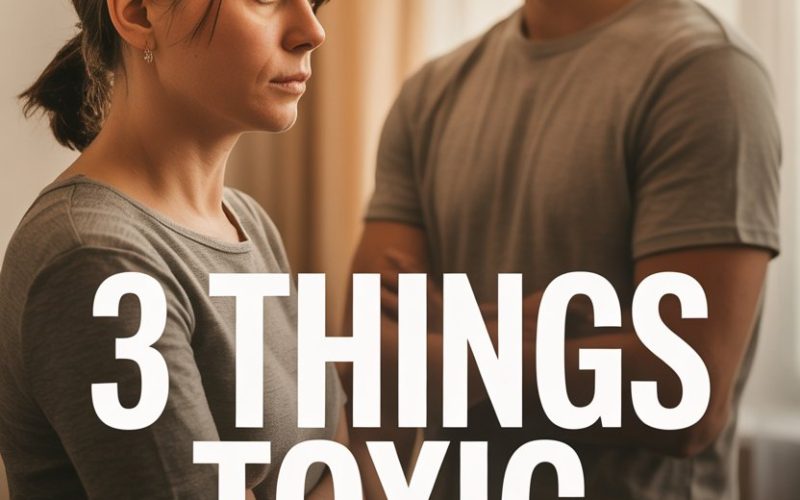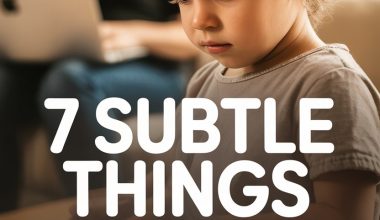Sibling bonds are supposed to last a lifetime. But what happens when the people who share your roof also share a talent for making each other’s lives miserable?
If your children’s idea of “bonding” involves door-slamming, emotional warfare, and more eye rolls than a teenager at a family dinner, you might be witnessing toxic sibling behaviour.
Take a breath. It’s more common than you think—and you aren’t alone on this wild parenting ride.
Here’s what to watch out for, and how to shut it down before your living room turns into a low-budget soap opera.
1. The Emotional Undercutter
Some siblings go straight for the jugular—emotionally, that is.
This isn’t your run-of-the-mill teasing over who got the biggest slice of cake. Toxic siblings know exactly which buttons to press, and they press them like they’re playing for high score.
Think: relentless criticism, belittling achievements, or always pointing out a sibling’s weaknesses.
Maybe your eldest calls the youngest “dumb” every time they get a maths problem wrong. Or your middle child insists their sister’s artwork “looks like it was drawn by a toddler with a crayon in their nose.”
These comments sting. More than that, they chip away at self-esteem, turning everyday squabbles into long-lasting wounds.
According to child psychologist Dr. Laura Markham, repeated emotional digs can rival bullying in terms of their impact.
How to Stop It:
- Name It to Tame It
Call out the behaviour, calmly but firmly. “That was pretty harsh. In this family, we treat each other with respect—even when we’re annoyed.” - Model Emotional Intelligence
Narrate your own feelings and reactions. “I’m frustrated, but I won’t say something hurtful. I need a minute.” Kids learn by watching you—like little emotion-sponges. - Encourage Repair
Once the dust settles, get both parties talking. “What can you say to help your sister feel better?” It’s not about forced apologies or making them hug it out (unless you want to witness the world’s most awkward embrace), but about teaching genuine empathy. - Reinforce Positive Interactions
Notice when they do show kindness. “I saw you help your brother with his reading. That was thoughtful.” Positive reinforcement isn’t just for puppy training. - Set Clear Family Rules
Write them down and stick them on the fridge: “We don’t insult each other.” A visual reminder beats yelling “Be nice!” for the sixth time before breakfast.
If you’re worried about chronic emotional abrasion, have a word with a family therapist, especially if self-esteem is taking a nosedive.
2. The Manipulator Extraordinaire
Some siblings go beyond bickering. They manipulate, pit others against each other, or play the victim to get a bigger slice of mum or dad’s attention pie.
Maybe your oldest always blames little brother for spilled juice—even when the evidence (and the juice moustache) says otherwise. Or your youngest turns on the waterworks every time their sister gets something nice, just to score an extra treat.
Manipulation is sly. It can leave you feeling like a detective in your own house, constantly trying to figure out who really started it.
The trouble is, unchecked manipulation can morph into a lifelong habit, making it hard for your kids to build honest relationships down the road.
According to child development experts at the Child Mind Institute, children who rely on manipulation at home are more likely to use those same tactics with friends, partners, and colleagues later on.
How to Stop It:
- Don’t Play Judge Judy
Instead of getting sucked into a whodunit at every dispute, focus on problem-solving. “I don’t need to know who started it. What are we doing to fix it?” - Avoid the Victim-Perpetrator Trap
Watch for patterns. If one child is always the victim, check for crocodile tears. Encourage all your kids to speak up about their feelings without assigning blame. - Teach Assertiveness
Kids who manipulate often lack healthy ways of asking for what they need. Coach them: “If you want more time with me, you can say, ‘Mum, can we have a chat after dinner?’” - Establish Consequences
Consistency is key. If fibbing or scheming earns a cool-off session or loss of privileges every time, the thrill of manipulation soon fizzles. - Hold Family Meetings
Keep it short and simple (no need for PowerPoint slides). Discuss fairness, taking turns, and being honest. Let everyone air their grievances—with a talking stick, if necessary. It sounds a bit hippie, but it works.
Raising straight-shooters rather than master manipulators takes patience, but you’re setting them up for real-world relationships—where people rarely fall for the “but she started it!” routine.
3. The Physical Provoker
Some siblings prefer actions over words. Not the fun kind, like building pillow forts together—think pinching, shoving, hair-pulling, and sneak attacks that would make a ninja jealous.
A one-off scuffle over the TV remote? Annoying, but normal. But if pinches turn to punches, and the aggression is ongoing, it’s time to intervene.
Physical provocation can cross the line into abuse, leaving both physical and emotional scars.
According to research, sibling violence is surprisingly common, yet parents often brush it off as “just kids being kids.” Don’t fall for it.
How to Stop It:
- Zero Tolerance
Violence isn’t negotiable. “We don’t hit. Ever.” No family is perfect, but this rule should be ironclad. - Immediate Intervention
Step in right away. Separate everyone and help them calm down before talking it out. No angry lectures while adrenaline’s still pumping—wait for tempers to cool. - Teach Self-Regulation
Practice “stop and breathe” techniques together. Role-play positive ways to handle frustration—clap your hands, stomp your feet, or count to ten. It sounds simple, but these skills are gold. - Offer Space, Not Isolation
Sometimes kids need a breather. “Why don’t you both have some quiet time in your rooms? We’ll talk when you’re ready.” Solitary confinement (aka the classic “naughty step”) isn’t the goal; space to reset is. - Check for Triggers
Hunger, tiredness, or feeling overlooked can all spark sibling smackdowns. No one’s on their best behaviour when they’re hangry—adults included. - Reward Peacekeeping
Nothing says “well done” like an extra bedtime story or a chore skipped as a reward for peaceful play. Celebrate the moments when your kids share, solve conflicts, or manage not to whack each other with the Wii remote.
If physical aggression is escalating, or if you spot signs of real harm, reach out to a child psychologist or your GP. Asking for help isn’t failure—it’s a sign you take your kids’ wellbeing seriously.
Sibling Peace: Not a Unicorn, but Within Reach
Sibling drama won’t vanish overnight, and honestly, a little bickering is part of growing up. It teaches negotiation, boundaries, and (eventually) the fine art of not murdering your loved ones over the last biscuit.
But when things go beyond cheeky rivalry and into toxic territory, you have the power to reset the tone in your home—compassion, consistency, and a dash of humour go a long way.
Call out the behaviour, model what you want to see, and remember: every squabble is a chance for your kids to practice being decent humans.
One day, they might even thank you for it. Or at least promise not to call each other “poo-head” at Christmas dinner.
And honestly, that’s a win.




